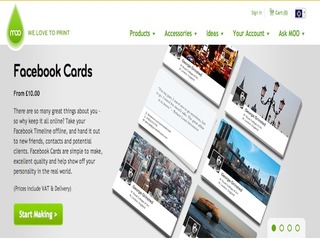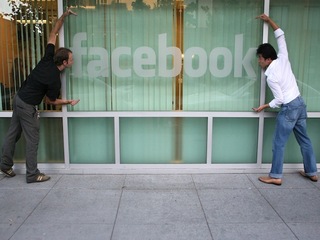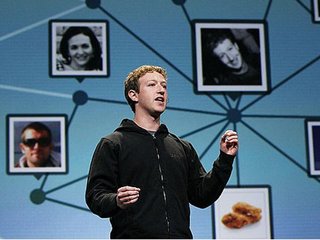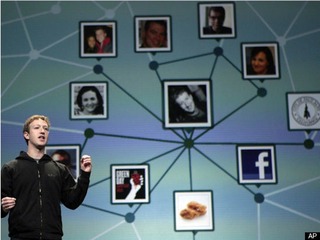The FDA outlines draft guidance on AI for medical devices
The agency also published draft guidance on the use of AI in drug development
Read more...
I grew up being constantly reminded that 'sharing is caring' and if that colloquialism holds true, than no industry seems to care more than social networks -- and no social network could care any more than Facebook.
From sharing pictures, thoughts, events and 'likes', Facebook has brought created an entire community on how instantaneous sharing can be -- but in September, the social network giant announced that the free-flowing information would get even more open and frictionless with Timeline and Open Graph: allowing people to see, in real time, what their friends are reading, watching and buying (even if it isn't something they are typing in on Facebook.)
While many Facebook users cringed that even more of their lives would be just a simple keystroke away from their boss and grandmother, marketers and companies looking to promote their products started jumping for joy at the thought viral marketing could initiate in such a free platform. Facebook was vague about when the, already very share-friendly environment would get a healthy douse of lubrication so that every online or offline interaction could potentially end up on your profile -- but we knew it was just on the horizon.
One feature at a time seemed to be slipping out into the network, perhaps to make the transition less jolting and to work out any kinks before it went live.
Facebook finally announced that its Open Graph initiative, is now expanding with 60 new partners.

Over the past few weeks, users have noticed that they were being notified that their friends were watching, listening to and reading different items (especially in the side chat scroll.)
Open Graph allows real-time sharing of almost anything you can image - and now that it is totally open you can expect to see that your friend is cooking a recipe that you can also read or try at home; you'll be able to see the route a friend ran over the weekend and possibly share when you run on the same path; and even when you co-workers buy tickets to an upcoming concert or event. Some companies like the Washington Post, Spotify and Hulu rolled out their beta Open Graph features over the last few weeks and now companies such as Ticketmaster, ScoreBig, AirBnB and Pintrest.
I got a chance to speak with Laura Goldberg, the vice president of products for ScoreBig, just before the announcement and she explained to me what a big change this will bring to her company and others in the ticketing business.
"This new Open Graph function is a very exciting opportunity," Goldberg told me in an interview. "It really brings social commerce and social events right onto a social platform, which adds to the experience."
Facebook users that connect with ScoreBig on the network will be able to share that they put in a bid for an upcoming show and this can help their friends discover the great prices and events that they can attend on their own or with friends. Goldberg also explained to me that this system can also help groups of friends go to the same events and request seating together and get referral points by bringing more people into the ticketing system.
Since one of the elements that is being added to the Open Graph application is that rather than the limiting "like" button being the only default verb Facebook users can connect to items, brands and events, new verbs such as cook, run, save, buy and watch will become part of the Facebook lexicon.
ScoreBig has chosen "save" and "made an offer" as the verbs that fit into their services best.
This announcement also marked the time that Facebook would start accepting applications from developers. As of Wednesday afternoon, the company launched a new application process that makes it easier for users to understand what will happen once they install the app.
Open Graph gives apps even more freedom to post what you are doing (once you have approved the app) and will no longer have to ask for permission to post content to Facebook over and over again.
But updates through the new Open Graph appear in the ticker automatically -- not appear in the News Feed unless it’s an important event -- so it is more for friends to discover similar articles and music rather than consider it the same as sharing an event or photo albums.
I have heard a lot of criticism coming from friends and professionals that have noticed publications like The Washington Post and The Guardian that appear to make opting in to the Facebook app mandatory to access some content but others just take it as the price to pay for getting content for free now.
Currently, Facebook Timeline is available to users on an opt-in basis. At some point soon — perhaps as early as this week — Facebook will start requiring users to migrate to the new design since it is the platform that was designed to harbor the full Open Graph set up.
That’s because Open Graph and Timeline go hand in hand; the idea is for each user’s activity across various Web sites and apps, both on and off of Facebook, to be aggregated as a visual living record of his or her life.
This Open Graph expansion announcement comes just months before the company is expected to file for an IPO -- which has been anticipated to arrive near May.
The IPO is estimated to raise $10 billion on a $100 billion valuation. The current user base is estimated at more than 800 million — which should exceed one billion this year -- and revenue was reportedly close to $4 billion for 2011.
Facebook has been clamoring to stay innovative and attract more brands, and their revenue dollars to the network, and Open Graph has kept many of those companies excited. Now, more than ever, consumers are happy to trade privacy for convenience, especially when they are sharing recommendations and events with people that they like and know -- it is like a big community board for the technology age and can result in better tracking of sale conversion.
The agency also published draft guidance on the use of AI in drug development
Read more...The biggest focus areas for AI investing are healthcare and biotech
Read more...It will complete and submit forms, and integrate with state benefit systems
Read more...



